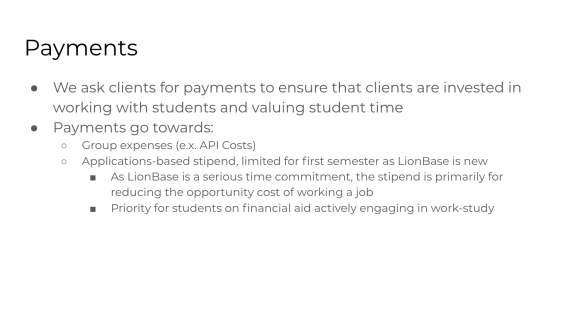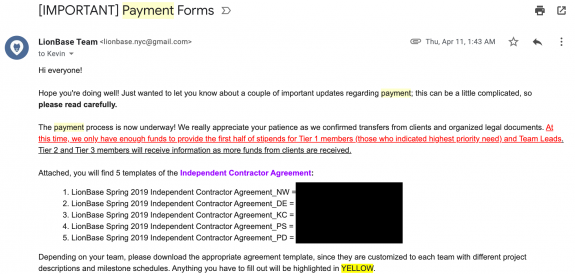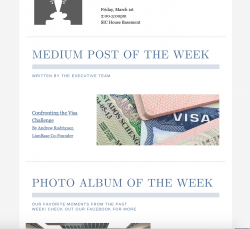Alma Bwogger Jenny Zhu investigates the fallibilities of a student startup.
Taped on all four corners to a pillar in Lerner Hall, a black and white advertisement for the student-founded data startup LionBase reads, “Average Contract Size? 5 figures. Projects completed? 8. People Involved? 30+. Number of Kevins? 8.” The company’s tagline skirts the bottom edge of the flyer: “Get paid for Data Science Consulting.”
These figures may seem remarkable given the fact that undergraduate students themselves lead, staff, and manage the entire startup. Founded in November 2018 by Kevin Le, SEAS ‘20, and a few friends, LionBase began as a group of students creating freelance data products, having soon evolved to become a company promising paid consulting gigs and a meaningful community for data-science-oriented Columbia students. In a culture in which college students are often doled out unpaid or minimally-paid internships – an environment inherently unfair to First Generation Low Income (FGLI) students – the startup distinguished itself for its ability to pay its students for their work and its friendly environment.
However, Bwog has recently received a report of experiences that seemingly challenge this branding of LionBase, referencing a controversial approach to pay and an alleged lack of delivery on its advertised values – leading to questions about broader issues faced by student-run startups.
‘Every job I’ve gotten, you get immediately enrolled with papers’
One anonymous student began working at LionBase in the spring of 2019. At the initial interview, the student describes being verbally assured that members who needed the financial assistance would be paid: “They were like, ‘Oh, we’re so friendly, we’ll make sure you’re paid, feel free to apply if you also work other jobs and stuff.’”
Meanwhile, the recruitment presentation from LionBase’s info sessions in its first two semesters, Fall 2018 and Spring 2019, had left the exact nature of payment open. It stated that, after contributing to group expenses, payments would be directed towards an “applications-based stipend” that would give “priority for students on financial aid actively engaging in work-study.”
A slide from the LionBase info session deck regarding payment
While a non-disclosure agreement (NDA) for the data product itself was sent to workers at the beginning of the semester, LionBase members did not receive further details about payment until early March, after a few weeks of work. This company-wide email on March 4, citing “significant start-up costs” and an effort to avoid “diluting the payment amount across the board,” stated that stipends would be paid on a “tier system based on self-reported financial need.”
Under this system, LionBase members and workers were required to fill out a form, in which they self-categorized their respective financial need into one of three “tiers” to the Executive Team – also comprised of students. Our source, who faces socioeconomic issues, described this as “a really shitty thing to do. They were basically like, ‘If you really need the money, justify your financial situation.’”
The tier system broke down financial need into three tiers, a “highest priority tier,” a “middle tier,” and a “minimal to no pay” tier. Having been advised by the Columbia Law School Entrepreneurship Clinic to use a system of freelance contractors, the LionBase Executive Team said in a statement that they viewed the self-reporting framework to have been the “most accurate way of fairly disbursing stipends across the organization.”
- An excerpt from the March 4 email, describing payment plans moving forward
- The tiers of financial need, as listed in the self-reporting form
“Since, as we established in our early information sessions, we prioritized reducing opportunity cost for those who needed it most to the best of our ability,” said the Executive Team, emphasizing that all information from the form remained private.
However, certain low-income members of the startup argue that they may not have necessarily wanted to disclose their identities, in the specific way required by the form. “It was very clear who was going to stay in the club after this need-based form was sent out, you know?” said our source. “This is not really a position to put people in. It’s hard to talk about your financial situation and why you’re doing what you’re doing.”
Shortly after members submitted the required financial need form, LionBase made several firings. According to fired members, the Executive Team gave a number of reasons for the termination – including a too-slow pace of work, hospital time for a disability that a member had faced, a lack of activity in completing an assignment. Our source described the rationales given as “all over the place.”
Executives allegedly told terminated members that they could continue contributing to the work at LionBase if they would like to, except without pay.
Ultimately, the total projected revenue of $50,000 earned that semester was primarily marked off for what the Executive Team deemed “operational expenses.” These operational expenses included $9,600 paid to client team leads, $7,500 stockpiled for a savings part of the budget, and $800 left in a discretionary budget.
After the operational costs, $10,935 of this $50,000 was left to pay client team members. According to the Executive Team, every team member of LionBase received a stipend at the end of the semester. In addition, those on the Executive Team did not receive any stipend or payment, save for one member “who put in a substantial amount of technical work on a specific client project and is an FLI student. This member received the same amount as a Team Lead.”
A formal employment contract was eventually sent to LionBase’s members on April 11 – near the end of the semester and approximately a month after discussion of payment had started. However, because some of the terminated students had been fired in mid-March, they never received an employment contract, despite having put in approximately an alleged 80 hours of work before their firing. These eventually terminated students were never paid.
The email with employment contracts, sent on April 11
“I thought [a contract] would come eventually because they were sending out all these legal forms for confidentiality, but they never sent out contracts. Money was just never generally talked about, which is weird because every job I’ve gotten, you get immediately enrolled with papers,” said our source.
‘We hope Lionbase will reduce barriers of entry’
Beyond the confusion regarding pay, the anonymous student described a lack of attention towards issues of accessibility within the company itself. Our source alleged that members of LionBase had suggested developing wireframes for the app, which would better assist users of the app who had disabilities. However, other members and leads had reportedly suppressed the proposal, saying that the team could postpone wireframing for the end.
“[A data product] is a very person-facing project, and every time I brought up accessibility for people who have disabilities, [LionBase] just kind of pushed it down,” said the student.
What proves contradictory to these experiences, however, is the fact that LionBase touts its diversity as a central tenet of the organization. The introductory post on LionBase’s Medium blog reads: “We hope LionBase will reduce barriers of entry into data science and product development by allowing students of all backgrounds to grow and apply their potential.”
This publicization of a home-grown diversity, the destruction of barriers in the data science industry, and the inclusion of all backgrounds remain a common theme throughout LionBase’s branding and advertising. Its flyers, which mention members by name and references the 30+ individuals involved in the organization, similarly create an inclusive, communal feel.
Our source cites these very reasons as integral to her desire to join: “I was like, ‘Wow, this is so cool.’ Usually, I don’t feel comfortable getting involved in tech at Columbia, because it’s such a bro space. I don’t feel comfortable with my socioeconomic situation, regardless of where I interned over the summer.”
For possible recruits, an inclusive atmosphere thus distinguishes LionBase among other similar clubs at Columbia. The diverse composition of its members is mentioned in LionBase’s introductory post, which states that “several of us [members] identify as first-gen, and all of us are students benefiting from financial aid.”
The accuracy of the LionBase branding, however, seems contestable. Our source denies experiencing this inclusivity, describing only one or two Black women on the whole team and a lack of members with any disclosed disabilities. “When you look in the room when you’re actually there, it’s the same person over and over and over again. Everyone’s got the expensive bags and jackets and stuff,” said the student. “Diversity is a pretty big word to use when you don’t actually practice that.”
The grievances above, however, are not the only challenges that LionBase has historically faced. By the end of its first semester of operations, the startup company reportedly also found itself unable to pay its international students due to visa issues. “They did a whole semester of work, and they weren’t compensated for it whatsoever. And it seems like they did the same thing again this semester,” said the anonymous member. “They were just not really FLIP-friendly at all.”
In fact, the founders of LionBase had even issued an official statement on the incident on its Medium blog, addressing the scandal in a post titled, “Confronting the Visa Challenge.” After first making known to the international workers that the company was unable to pay them for their labor, despite previous promises, the Executive Team then apologized. As seen in the screenshot below, this public statement was included in a newsletter sent out to its members.
- LionBase newsletter linking to the post regarding international visas
- The deleted Medium post
The company, however, has since taken down this public statement, with the original link leading to an error stating that “the author deleted this Medium story.”
LionBase’s discreet take-down of the post only leads to further questions about the startup’s transparency and whether it has properly addressed labor problems of its past – significant issues, given that such a scandal would contradict its heavily diversity-based advertising directed both towards corporate clients and student workers themselves.
‘They’ve never really apologized’
By the end of 2018, LionBase’s founders had officially registered the startup as an LLC, a business structure that provided its owners the limited liability of a corporation, maintained completely independent from Columbia itself. As Spec writes in its feature of the company at its first anniversary: “LionBase strives to maintain the professionalism of a startup through its work with companies in the city, while offering members a genuine community on campus.”
In their statement to Bwog, the LionBase Executive Team attributed any confusions and controversies of its past to the growing nature of the startup. “As with any organization in its early stages, LionBase faced financial uncertainty in its first semester as the majority of founding members identify as First-Generation Low-Income students and we started the organization with no outside funding of any kind,” said the Executive Team.
But this claim on the professionalism of an established company frays at its edges as LionBase attempts to also preserve the casual, inclusive environment of a student community, creating an ambiguity in the domain of workers’ rights. Executives are left to decide on issues such as whether “friends” that work for them necessarily require a formalized contract from the outset of employment, or if demanding the self-reporting of an employee’s socioeconomic status – albeit within an ostensibly safe, inclusive community – is acceptable.
I don’t trust girlboss companies who use intimate gal pal language with their workers any more than I trusted techbro companies who installed ping pong tables for their workers. absent of actual worker protections, informality is just an accelerant for work-life boundary erosion
— fangmeli (@pangmeli) December 10, 2019
The company has, however, taken some steps to transform its relationship with its team members in the coming semester. As the Executive Team has noted, LionBase aims to operate under an employer-employee business model in spring 2020, which would pay students on an hourly basis. “We are proud to have fostered the professional and personal development of the over 30 students who were and/or are involved with LionBase. Many made lasting friendships and were able to pivot into or advance in a space that has many barriers to entry,” said the Executive Team.
For dissatisfied students, the primary outstanding grievance is the lack of a direct, personal response from LionBase. The company’s apology to its international workers still remains quietly buried. “My main kind of issue is just that they’ve never really apologized for these things,” said our source. “They’ve never really gone out to right the wrongs.”


 2 Comments
2 Comments






2 Comments
@Anonymous If you don’t like it, start your own business. No one is stopping you.
@Anonymous Don’t bash your friends‘ company. You should encourage these start ups. Why don’t you start a better one yourself? This is how all start ups work.